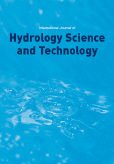
International Journal of Hydrology Science and Technology
Scope & Guideline
Fostering Interdisciplinary Dialogue for Water Resource Management
Introduction
Aims and Scopes
- Hydrological Modeling and Simulation:
Focuses on the development and application of various hydrological models to simulate water flow, quality, and sediment transport in different environments. - Impact of Climate Change on Hydrology:
Investigates how climate change affects hydrological cycles, including changes in precipitation patterns, streamflow variability, and groundwater recharge. - Water Quality Assessment and Management:
Addresses the assessment of water quality in various water bodies, along with the strategies for managing and improving water quality, especially in urban and agricultural settings. - Remote Sensing and GIS Applications:
Utilizes remote sensing and Geographic Information Systems (GIS) for monitoring hydrological phenomena, land use changes, and water resource planning. - Groundwater Studies:
Explores groundwater dynamics, including recharge, quality assessment, and contamination studies, to understand sustainable groundwater management. - Flood and Drought Risk Assessment:
Focuses on methodologies for assessing flood and drought risks, including modeling approaches and decision support systems for effective management. - Sustainable Water Resource Management:
Promotes strategies for sustainable management of water resources, incorporating socio-economic and environmental considerations.
Trending and Emerging
- Machine Learning and Artificial Intelligence in Hydrology:
There is a growing trend towards the application of machine learning and AI techniques for hydrological modeling, prediction, and data analysis, which enhances the accuracy and efficiency of hydrological studies. - Climate Change Adaptation Strategies:
Research is increasingly centered on developing adaptation strategies to mitigate the impacts of climate change on water resources, including innovative management practices and infrastructure design. - Integrated Water Resource Management (IWRM):
Emerging interest in IWRM approaches that consider the interconnections between water, land, and ecosystems reflects a holistic view of water management. - Assessment of Natural Hazards:
Increased focus on assessing natural hazards such as floods and droughts, utilizing advanced modeling techniques and risk assessment frameworks to improve disaster preparedness and response. - Socio-Economic Impacts of Water Resource Management:
Research is increasingly addressing the socio-economic implications of water management practices, emphasizing the importance of community engagement and policy implications.
Declining or Waning
- Traditional Water Management Techniques:
Research on conventional water management practices is diminishing, possibly due to a shift towards more innovative and integrated approaches. - Historical Hydrological Analysis:
Studies focusing on historical hydrological data and analysis are becoming less prevalent, as the emphasis moves towards predictive modeling and real-time data applications. - Single-Factor Impact Studies:
Research that examines the impact of single factors (e.g., only rainfall or temperature) on hydrology is waning, as there is a growing recognition of the need for multi-factorial approaches. - Localized Case Studies:
While case studies remain important, there is a noticeable decline in localized studies that do not incorporate broader regional or global contexts, reflecting a trend towards more generalized findings. - Low-Tech Water Quality Monitoring:
Research employing low-tech methods for water quality monitoring is decreasing, as there is a strong push for advanced technologies and automated systems in data collection.
Similar Journals

Hydrology Research
Advancing water science for a sustainable future.Hydrology Research, a leading academic journal published by IWA Publishing, is dedicated to advancing the field of water science and technology. With an impressive impact factor and a Q2 ranking in its category, the journal plays a pivotal role in disseminating innovative research and practices in hydrology. Established in 1973 and transitioning to an Open Access model in 2020, it provides unrestricted access to high-quality articles that cover a broad spectrum of topics, including hydrological processes, water management, and environmental impact assessments. Situated in Denmark, Hydrology Research continues to thrive as an essential platform for researchers, professionals, and students alike, encouraging the exchange of ideas that contribute to sustainable water solutions worldwide. With a comprehensive coverage of research converging from 1973 to 2024, it stands as a testament to ongoing progress in the water science community.
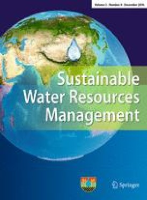
Sustainable Water Resources Management
Driving impactful practices for sustainable water resources.Sustainable Water Resources Management is an esteemed journal focusing on the critical field of water resource management in the context of sustainability. Published by Springer International Publishing AG, this journal serves as a vital platform for researchers, policymakers, and practitioners to disseminate cutting-edge research and innovative practices aimed at addressing global water challenges. With an impressive impact factor aligned with its Q2 ranking in Water Science and Technology and Q3 in Renewable Energy, Sustainability, and the Environment, it maintains a robust reputation in its field, evidenced by its Scopus rankings. Covering a diverse range of topics from integrated water resource management to the nexus between water and energy, Sustainable Water Resources Management is committed to fostering knowledge exchange and encouraging interdisciplinary dialogue among its audience. This journal, operating under strict academic rigor, plays an essential role in advancing sustainable practices and is open from 2015 to 2024, making it a relevant resource in today’s rapidly evolving environmental context.
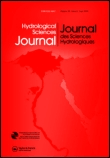
Hydrological Sciences Journal
Unveiling insights into hydrological challenges and solutions.Hydrological Sciences Journal, published by Taylor & Francis Ltd, is a leading peer-reviewed publication dedicated to advancing the field of hydrology, spanning topics from water management to climate impacts on hydrological systems. With an impressive impact factor and a noted Q1 category ranking in Water Science and Technology, the journal occupies a pivotal role in the academic landscape, facilitating high-quality research dissemination since its inception in 1982. The journal is indexed in Scopus, holding a commendable rank of #48 out of 261 in the Environmental Science category, placing it in the 81st percentile among its peers. Although it does not offer Open Access options, the journal ensures extensive reach and readership through institutional subscriptions. As it converges toward its milestone of 2024, the Hydrological Sciences Journal remains an indispensable resource for researchers, professionals, and students eager to explore the latest advancements and methodologies in hydrological research.

Water Resources
Fostering scholarly dialogue on critical water issues.Water Resources, a prominent journal published by MAIK NAUKA/INTERPERIODICA/SPRINGER, focuses on the critical and evolving field of water science and technology. Established in 1976 and with a long-standing commitment to advancing knowledge, this journal explores interdisciplinary research that addresses the challenges surrounding water resource management, quality, and sustainability. With an impact factor positioned within the Q3 category of its field, it holds a notable Scopus rank (#181/261) in Environmental Science, emphasizing its role in driving scholarly discourse. While currently not open access, Water Resources provides vital insights for researchers, professionals, and students, making it an essential resource for those seeking to innovate and implement effective water management solutions. To stay ahead in a domain that is increasingly paramount to global sustainability efforts, consider engaging with the latest research published in this vital journal.

Journal of Hydrology-Regional Studies
Empowering research to transform hydrological practices.Journal of Hydrology-Regional Studies, published by ELSEVIER in the Netherlands, stands as a leading open-access platform since 2014 for disseminating high-quality research in the fields of hydrology and water management. With an impressive impact factor and recognition as a Q1 journal in both Earth and Planetary Sciences and Water Science and Technology categories, it emphasizes regional studies that advance understanding of hydrological processes and their implications for sustainable management practices. The journal has established a significant global reach, evident from its Scopus rankings, which place it in the top percentiles within its disciplines, fostering a dynamic exchange of ideas among researchers, professionals, and students alike. By mobilizing critical insights and innovative solutions in hydrology, this journal aims to contribute to solving the pressing water-related challenges faced by our society.

Frontiers in Earth Science
Pioneering Research in Earth and Planetary SciencesFrontiers in Earth Science is a leading open-access journal published by FRONTIERS MEDIA SA, based in Switzerland. With its ISSN N/A and E-ISSN 2296-6463, this journal has firmly established itself in the realm of Earth and Planetary Sciences, evidenced by its exceptional Q1 ranking in the 2023 category of Earth and Planetary Sciences (miscellaneous) and a solid position of Rank #66/195 in Scopus, placing it in the 66th percentile among its peers. Since its inception in 2013, Frontiers in Earth Science has embraced the open access model, promoting widespread dissemination and accessibility of research findings. The journal covers a broad scope, including areas such as geology, meteorology, oceanography, and environmental science, fostering interdisciplinary communication and advancement. Researchers, professionals, and students looking to stay at the forefront of Earth science research will find an invaluable resource in this journal, which not only curates high-quality research but also supports innovative and impactful studies that address the pressing challenges facing our planet today.
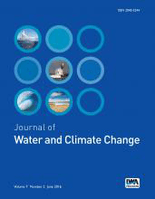
Journal of Water and Climate Change
Innovating Strategies for Water Sustainability Amid Climate ChangeJournal of Water and Climate Change is a premier open-access journal published by IWA Publishing, dedicated to advancing the understanding of the interplay between water resources and climate change. With an ISSN of 2040-2244 and an E-ISSN of 2408-9354, this journal has established itself as a crucial platform for interdisciplinary research, publishing high-quality articles that address the challenges posed by climate variability on water systems globally. Since achieving open access status in 2021, the journal has fostered wider dissemination of knowledge among its audience, featuring works that span pivotal topics in Atmospheric Science, Global and Planetary Change, and Water Management. Notably ranked within the top quartiles in several relevant categories as of 2023, it occupies a vital position in the academic community, offering insights that are essential for policymakers, environmental scientists, and researchers striving to create sustainable solutions for water and climate challenges. Its commitment to excellence is reflected in its strong Scopus rankings, standing at the 66th percentile in Water Science and Technology and 65th percentile in Management, Monitoring, Policy, and Law. Located in the United Kingdom, this journal not only serves as a repository of cutting-edge research from 2010 to 2024 but also engages a diverse readership passionate about promoting sustainable water management practices.
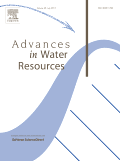
ADVANCES IN WATER RESOURCES
Elevating the discourse on critical water issues.ADVANCES IN WATER RESOURCES is a premier peer-reviewed journal published by Elsevier Science Ltd, dedicated to advancing the field of water science and technology since its inception in 1977. With an impressive Q1 ranking in the field, this journal provides a vital platform for researchers, professionals, and students to disseminate cutting-edge research that addresses critical issues related to water resources management, hydrology, and environmental sustainability. The journal offers a comprehensive collection of articles that explore innovative methodologies, policy implications, and case studies that shape the future of water resource management. Although it does not provide open access, its impactful contributions are recognized globally, making it an essential resource for anyone engaged in water science. The journal continues to publish relevant research while looking forward to bridging the gap between theoretical insights and practical applications up until 2024.

Hydrology
Leading the way in hydrological research and innovation.Hydrology, published by MDPI, is a prominent open-access journal dedicated to advancing the field of hydrological science. Since its establishment in 2014, the journal has garnered a reputation for excellence, reflected in its classification within the Q2 quartile for 2023 across multiple categories including Earth-Surface Processes, Oceanography, Water Science and Technology, and Waste Management and Disposal. Based in Switzerland, Hydrology provides a vital platform for scholars and practitioners to disseminate research findings, promote innovative methodologies, and foster discussions on current trends affecting water resources and management globally. The journal is easily accessible online and aims to significantly contribute to the understanding of hydrological processes, offering insights that are pivotal for addressing contemporary environmental challenges. With Scopus rankings showcasing its growing influence, Hydrology is a crucial resource for researchers, students, and professionals committed to water science and sustainable practices.
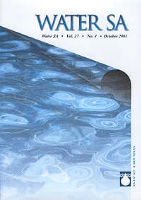
WATER SA
Driving impactful research in water science and technology.WATER SA, published by the WATER RESEARCH COMMISSION, serves as a pivotal platform for interdisciplinary research in the areas of water science and technology. With an ISSN of 0378-4738 and an E-ISSN of 1816-7950, this open-access journal has been committed to disseminating knowledge since 2005, ensuring that research is freely accessible to a global audience. As of 2023, it holds a Q3 ranking in several key categories including Applied Microbiology and Biotechnology, Management, Monitoring, Policy and Law, Waste Management and Disposal, and Water Science and Technology. These rankings reflect its significant contribution to these disciplines, particularly in South Africa where it is based. With a history dating back to 1976 and converging research efforts extending through 2024, WATER SA aims to illuminate pressing water-related challenges and foster innovative solutions through rigorous scientific inquiry. Researchers, professionals, and students interested in the sustainability and management of water resources will find its comprehensive portfolio essential for advancing their work and understanding in an increasingly critical field.